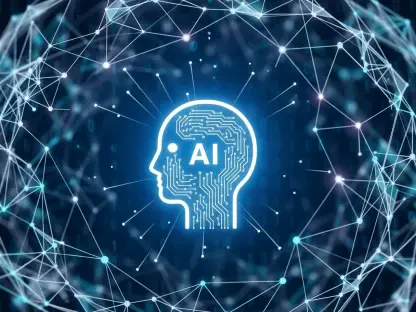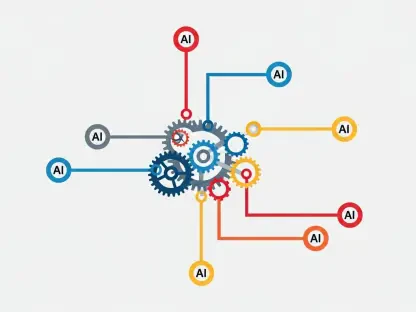The landscape of software development is undergoing a seismic shift, driven by the rapid advancements in artificial intelligence (AI). AI has become a transformative force reshaping the industry’s very foundation rather than merely an addition to the developer’s toolkit. The advent of increasingly sophisticated AI technologies marks a significant evolution in software development practices, promising to enhance productivity, improve code quality, and spur innovation. This article explores the various ways AI is revolutionizing software development.
Context-Aware AI in Software Development
One of the most promising advancements is the evolution of context-aware AI. Unlike traditional AI that focuses on simpler tasks, context-aware AI deepens its understanding of both user and application environments. This progression allows AI to automate intricate tasks, anticipate the needs of developers, and make informed decisions that enhance efficiency and accuracy. Such AI systems have the potential to analyze existing codebases comprehensively, suggest new functionalities aligned with architectural requirements, and adhere to security protocols automatically.
Moreover, the role of AI in streamlining code reviews, improving testing processes, and managing legacy systems will further underscore its significance in software development. For instance, AI-assisted code reviews can expedite the identification of potential issues by flagging areas that deviate from established standards and best practices. These reviews can be based on performance predictions, fostering better collaboration among teams and improving overall code quality. Additionally, AI can generate comprehensive tests by understanding application logic and performance characteristics, thereby preventing defects before they reach production. When managing legacy systems, AI will propose updates that consider the codebase and underlying infrastructure, ensuring that changes maintain security and compliance.
Measuring AI’s Impact on Organizations
The increasing adoption of AI across various business functions raises the question of measuring its impact accurately. Leaders are encouraged to refine their focus from broad questions to specific, quantifiable outcomes like time to market, software quality, operating costs, and developer productivity. This fine-tuned approach will enable organizations to gauge AI’s contributions and optimize future investments. Incorporating AI into processes is not enough; assessing its effectiveness and making informed decisions based on real data will be crucial.
Enterprises must ensure that their AI investments yield substantial returns by focusing on measurable metrics and outcomes. For example, rather than asking the broad question, “How is AI increasing my bottom line?” leaders should examine more concrete business outcomes. They should focus on how AI has impacted the time required to develop software projects, the quality of the software produced, the costs involved in operations, and the overall productivity of development teams. By concentrating on these specific and quantifiable metrics, senior leaders can accurately evaluate AI’s benefits and justify further investments in areas where AI excels.
Autonomous Agents Reshaping the Developer Role
The rise of autonomous AI agents represents another pivotal shift in software development. These agents, growing increasingly sophisticated, are moving from simple prompt-based interactions to becoming central hubs for code assistance. Capable of executing tasks independently, learning continually, and collaborating with other agents, they promise to make the development lifecycle more streamlined. Developers will evolve to become “AI architects,” shaping and guiding these intelligent agents. The synergy between human intuition and AI precision will enhance productivity, improve code quality, and enable developers to focus more on strategic and creative aspects.
As AI agents become more proficient, their capabilities will extend to writing unit tests, refactoring code for efficiency, and suggesting architectural improvements autonomously. These advancements in AI will not render developers obsolete; rather, they will shift the developer’s role towards more strategic oversight. Developers will become mentors to AI, directing them to tackle complex challenges and ensuring they integrate seamlessly into the development process. This transformation will result in developers focusing on higher-level decision-making, leaving more routine and repetitive tasks to the AI agents, thereby driving higher productivity and ensuring better-quality software output.
On-Premises AI Model Training
Training AI models on internal company data can unlock insights specific to the organization’s operations, driving significant improvements. In highly regulated industries like banking and healthcare, the need for on-premises AI model training is particularly critical for compliance and security reasons. The advancement of open-source AI technologies has made it feasible for businesses to deploy powerful models cost-effectively on their premises. This approach ensures compliance and allows organizations to harness the full potential of their data for model fine-tuning, resulting in tailored and more effective AI applications.
Deploying on-premises AI models allows organizations to maintain full control over their data, ensuring it is utilized securely and in line with regulatory standards. In industries where data sensitivity is paramount, such as finance and healthcare, running AI models on-premises mitigates risks associated with data breaches or non-compliance with legal mandates. Moreover, by utilizing open-source AI technologies, businesses can take advantage of the latest advancements without incurring the high costs associated with commercial AI solutions. This democratization of AI technology enables organizations to develop and deploy robust AI applications tailored to their specific needs and objectives, fostering innovation while adhering to compliance requirements.
Evolving Developer Skills and Roles
As AI takes on more complex tasks within software development, the skills and roles of developers are bound to evolve. The emphasis will shift towards a blend of technical and strategic proficiency. Developers will need to harness AI tools effectively, ensuring they remain indispensable to the process. The transformation will require continuous learning, adaptability, and a nuanced understanding of both AI capabilities and their application within various contexts. This evolution heralds a new era of software development where human ingenuity is augmented by AI-driven precision.
Developers will need to stay abreast of the latest AI technologies and methodologies, ensuring they can integrate these tools seamlessly into their workflows. As the landscape evolves, there will be a growing demand for developers who possess a deep understanding of AI principles alongside traditional coding expertise. This duality will become a crucial differentiator in the industry, with developers needing to balance technical prowess with strategic acumen. Additionally, the emphasis on continuous learning will be paramount, as developers will need to keep pace with rapid technological advancements and evolving industry standards.
Anticipated Organizational Benefits
The realm of software development is experiencing a dramatic transformation, largely fueled by the rapid advancements in artificial intelligence (AI). Rather than serving merely as an auxiliary tool for developers, AI is proving to be a game-changer, fundamentally altering the core of the industry. The emergence of highly sophisticated AI technologies signals a significant evolution in the practices of software development. These advancements promise not just to boost productivity but also to enhance code quality and drive unprecedented levels of innovation. AI is bringing forth changes that were previously unimaginable, and this article delves into how AI is revolutionizing the landscape of software development in various impactful ways. From automating repetitive tasks to facilitating predictive analytics and improving the overall efficiency of the development lifecycle, AI’s role is becoming indispensable. The integration of AI into software development practices is setting new standards and opening up a world of possibilities that are transforming the industry as we know it.









